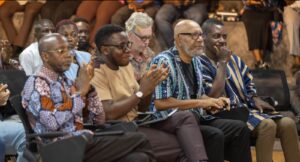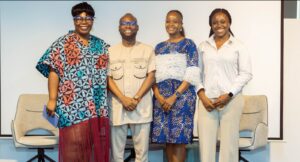ALX Ghana has reaffirmed its commitment to helping bridge the digital literacy gap in the country, with an ambitious plan to equip about 150,000 youth including those in rural communities, with 21st-century digital skills this year.
This pledge was made by the Country Manager, Nana Darko Asiedu, during the Youth and Tech Dialogue (YTD), a high-impact event, which brought together industry leaders, educators, and young innovators under the theme “Unlocking Youth Potential for Ghana’s Digital Transformation.”
“At ALX, we believe that digital skills should be acquired at an early age. This year, we plan to train about 150,000 youth, with a special focus on high school graduates and rural communities,” he stated.
Highlighting the significance of YTD, Mr. Asiedu explained that the event was designed to unite key players within Ghana’s technology ecosystem and showcase its impact on youth development.
“We observed that several players within the ecosystem were working in silos. YTD serves as a platform to bring them together, highlight the power of technology, and demonstrate how it is positively transforming the lives of Ghanaian youth. Since YTD is hosted by ALX, we are showcasing our own talents, featuring them as panelists and roundtable discussion participants to drive crucial industry conversations,” he said.

When asked about the prospects of transitioning Ghanaian youth from digital consumers to creators and employers, Nana Darko Asiedu expressed optimism saying:
“Ghana’s digital market is poised for significant growth. Based on the progress we’ve witnessed over the past five years, we believe the ecosystem will scale up rapidly.”
On his part, President of Academic City University College, Professor Fred McBagonluri, urged Ghanaian youth to take an active role in the country’s digital transformation by becoming digital creators rather than mere consumers.
“The world as we all know is racing towards a digital future. Thus, we cannot afford for Ghana’s youth to be simply digital consumers, they must be digital creators and must actively participate in the nation’s digital transformation,” he emphasized.
Delivering the keynote address Prof. McBagonluri highlighted the crucial role of young people in shaping Ghana’s digital revolution.
“Our greatest asset is no longer gold, cocoa, or oil—it is the energy, creativity, and talent of our youth. Today, over 60% of Ghana’s population is under the age of 25, making this a goldmine of potential for the country’s digital revolution,” he remarked.
While acknowledging the youth’s role in driving digital transformation, he stressed the need for capacity building and adequate support to empower them. He advocated for intentional efforts, including the integration of coding into the basic education curriculum, expansion of access to tech hubs and online learning, and strategic partnerships with global tech giants to provide certifications and hands-on training. Additionally, he emphasized the importance of prioritizing affordable internet access and enhancing digital infrastructure in schools and communities by relevant stakeholders.
Furthermore, Prof. McBagonluri called on relevant stakeholders to incorporate strategies into Ghana’s national development plan to unlock the full potential of the youth for digital transformation.
“Building a transformative digital revolution is not just the responsibility of the youth—it is a national mission. It must be embedded in our national development plan with clear milestones and evaluation metrics. The government must take the lead, supported by private sector players and educational institutions,” he stated.

A highlight of the event was a panel discussion on the topic: Tech Forward Building a Collaborative Youth and Tech Ecosystem. Together, Dr. Vandyck Lomotey, Country Director for Generations Ghana, Constance Swaniker-Founder & President-Design Technology Institute, Esinam Adorkor-Programme Partner for Digital Economy, Mastercard Foundation as panelists with Marie-Noelle Nwakolo as moderator churned out insightful nuggets.
The insights bothered on the role of collaboration in driving digital transformation, strategies for bridging the skills gap in tech and opportunities for young innovators and entrepreneurs.
Organized by ALX, Youth & Tech Dialogue is set to become an annual event. In the long term, it aims to serve as a key platform for fostering youth participation in Ghana’s digital transformation journey.










